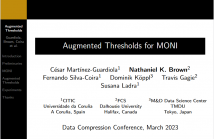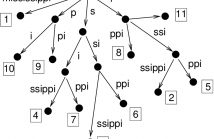
- Read more about Transient Dictionary Learning for Compressed Time-of-Flight Imaging
- Log in to post comments
Time-of-Flight imaging aims to retrieve the 3D geometry of a scene from the delay that a modulated light waveform experiences when interacting with the former.
Multi-path interference, arising from translucent objects or concave geometries, poses a challenge when the problem is to be solved from few measurements.
2023039374.pdf
- Categories:
 12 Views
12 Views
- Read more about Transient Dictionary Learning for Compressed Time-of-Flight Imaging
- Log in to post comments
Time-of-Flight imaging aims to retrieve the 3D geometry of a scene from the delay that a modulated light waveform experiences when interacting with the former.
Multi-path interference, arising from translucent objects or concave geometries, poses a challenge when the problem is to be solved from few measurements.
- Categories:
 35 Views
35 Views
- Read more about Transient Dictionary Learning for Compressed Time-of-Flight Imaging
- Log in to post comments
Time-of-Flight imaging aims to retrieve the 3D geometry of a scene from the delay that a modulated light waveform experiences when interacting with the former.
Multi-path interference, arising from translucent objects or concave geometries, poses a challenge when the problem is to be solved from few measurements.
- Categories:
 20 Views
20 Views
- Read more about Single-shot Fractional Fourier Phase Retrieval
- Log in to post comments
Traditional phase retrieval is generally concerned with recovering a signal from its Fourier magnitude measurements whose inherent ambiguities make this problem especially difficult. In this work, we present an efficient phase retrieval technique from the single fractional Fourier transform (FrFT) magnitude measurement. Specifically, the FrFT measurement can be well-combined with signal priors via a generalized alternating projection framework, which can effectively alleviate the ambiguities of phase retrieval and the stagnation problem of numerical iterative processes.
- Categories:
 54 Views
54 Views
- Read more about Permutation Entropy for Graph Signals
- Log in to post comments
Entropy metrics (for example, permutation entropy) are nonlinear measures of irregularity in time series (one-dimensional data). Some of these entropy metrics can be generalised to data on periodic structures such as a grid or lattice pattern (two-dimensional data) using its symmetry, thus enabling their application to images. However, these metrics have not been developed for signals sampled on irregular domains, defined by a graph.
- Categories:
 35 Views
35 Views
- Read more about Constrained Autoencoders: Incorporating equality constraints in learned scientific data compression
- Log in to post comments
As today's scientific simulations with high-performance computing produce an extremely large amount of data, reliable data compression techniques are becoming important. In scientific applications, downstream quantities derived from the original or primary data (PD) are crucial for post-analysis, and therefore these Quantities of Interest (QoI) are required to be preserved during compression. While autoencoders (AEs) have recently been used for the compression of scientific datasets, there is a clear lack in the literature w.r.t.
- Categories:
 29 Views
29 Views
- Read more about Augmented Thresholds for MONI
- Log in to post comments
MONI (Rossi et al., 2022) can store a pangenomic dataset T in small space and later, given a pattern P, quickly find the maximal exact matches (MEMs) of P with respect to T. In this paper we consider its one-pass version (Boucher et al., 2021), whose query times are dominated in our experiments by longest common extension (LCE) queries. We show how a small modification lets us avoid most of these queries and thus significantly speeds up MONI in practice while only slightly increasing its size.
- Categories:
 31 Views
31 Views
- Categories:
 55 Views
55 Views
- Read more about Computing Matching Statistics on Wheeler DFAs
- Log in to post comments
Matching statistics were introduced to solve the approximate string matching problem, which is a recurrent subroutine in bioinformatics applications. In 2010, Ohlebusch et al. [SPIRE 2010] proposed a time and space efficient algorithm for computing matching statistics which relies on some components of a compressed suffix tree - notably, the longest common prefix (LCP) array.
- Categories:
 82 Views
82 Views
- Read more about Abstract Huffman Coding and PIFO Tree Embeddings
- Log in to post comments
Algorithms for deriving Huffman codes and the recently developed algorithm for compiling PIFO trees to trees of fixed shape [1] are similar, but work with different underlying algebraic operations. In this paper, we exploit the monadic structure of prefix codes to create a generalized Huffman algorithm that has these two applications as special cases.
- Categories:
 25 Views
25 Views